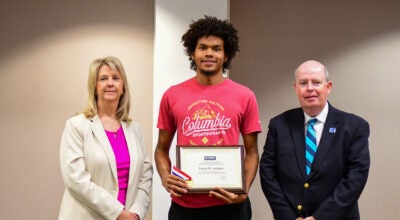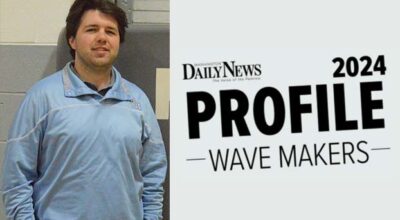ECU penalized
Published 1:05 am Friday, May 20, 2011
GREENVILLE — On Thursday East Carolina University announced it will serve a one-year probation sentence handed down by the NCAA after the institution was found guilty of committing academic fraud, which is classified as a major violation.
The sentence began Thursday and will conclude May 18, 2012.
After conducting an internal investigation the university discovered that one female tennis player, who was employed by the school as an academic tutor by the athletics department, wrote papers for four baseball players who paid the tennis player for her work over a year ago.
The terms of the probation do not prohibit postseason play in any sport, impose any recruiting sanctions or scholarship reductions and no monetary penalties were assessed. However, 17 baseball games and eight tennis matches will be vacated from last season’s record books.
Due to federal confidentiality law, the school couldn’t release the names of the players.
However, last year, baseball players Tyler Joyner, Bryan Bass, Stihl Sowers and Dustin Harrington were each dismissed from the team for violating team rules.
On Thursday, East Carolina provost and vice chancellor for academic affairs, Marilyn Sheerer, and ECU athletic director, Terry Holland, addressed the NCAA sanctions in a press conference held inside the Great Room 1 of the Mendenhall Student Center.
Baseball coach Billy Godwin and tennis coach Tom Morris were not in attendance but were backed by the school as Sheerer said, “We have great confidence in baseball coach Billy Godwin and women’s tennis coach Tom Morris and the integrity of their programs.”
In a written statement handed out before the press conference Holland stated, “This has been a traumatic event for our athletic program that has negatively impacted the lives of young student-athletes and embarrassed us all. While the athletics department’s response was immediate and appropriate, as recognized by the NCAA, it is critically important that the safeguards and guidelines implemented to educate our student-athletes are sufficient to prevent future problems.”
In wake of the scandal, ECU has hired an additional compliance officer, barred student-athletes from working as tutors in the Student Development Office within the athletics department, allowed the Division of Academic Affairs to oversee the Student Development office in place of the athletics department and developed more rigorous training for tutors and student-athletes.
The NCAA accepted the results of ECU’s investigation and did not perform one of its own. In a letter to the school the NCAA noted that it chose to reduce the term of probation from two years to one because of ECU’s response to the matter.
“The record shows we responded quickly, investigated vigorously, immediately self-reported violations and took decisive corrective steps without being asked,” Sheerer declared in a written statement.
According to the East Carolina University Public Infractions Report, the school was alerted of the academic fraud on March 2, 2010, when an intern in the athletics department’s student development office reported to the director of student development that two baseball players told her they paid a female tennis player to write an English paper for them.
That information was relayed to the executive associate director of athletics and shortly after the information had been received by Godwin, the baseball coach. The athletes, dubbed Student 1 and Student 2 by the report, confessed to the allegations and were immediately declared ineligible and indefinitely suspend from the team.
On March 18, 2010, the tennis player, dubbed Student 5, withdrew from the school due to a serious medical issue.
On April 1, 2010, Student 3 and Student 4 were interviewed by ECU and acknowledged they provided false information during previous interviews but again denied that Student 5 had written papers for either of them.
Based on the information provided by Student 5, which included audited emails from her past, and the inconsistent statements provided by Students 3 and 4, ECU concluded that both men had engaged in academic fraud.
According to the Infractions Report the first instance of academic fraud took place on Nov. 17, 2009 during a study hall session after Students 1 and 2 commented on how fast Student 5 was typing. The report states that Student 5 responded by offering to write English papers for each of the students at $10 per typed page. Students 1 and 2 accepted the offer and paid her $20 and $30, respectively.
Student 5’s email account showed that between the dates of Nov. 2, and Dec. 11, 2009, she had written eight papers for Student 3, with three of those being joined assignments with Student 4. Student 5 also wrote five papers for and created a PowerPoint presentation for Student 4.
In one interview, Student 3 denied the charges and claimed that he was only receiving “editorial suggestions” from Student 5. According to the report, Student 3 insisted the papers were his own saying, “I wrote the papers, it was my writing and then she corrected what I did.” He said he had written the papers on Student 5’s computer before emailing them to himself from her email account.
The school disagreed as stated in the report: “His story was unpersuasive, as the emails recovered from student-athlete 5’s computer made it clear that the papers where generated by her.”
On April 28, 2010, the university submitted a self-report of the violations to the NCAA.




